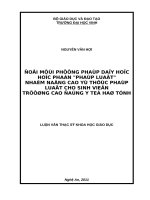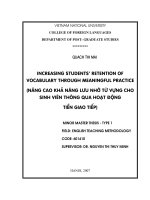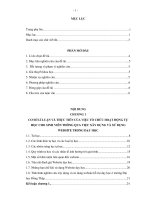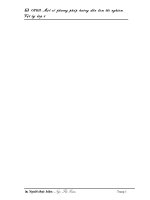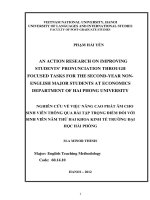- Trang chủ >>
- Địa lý >>
- Địa lý lớp 12
NÂNG CAO ĐỘNG LỰC HỌC VIẾT CHO SINH VIÊN THÔNG QUA HOẠT ĐỘNG HỌC TẬP MANG TÍNH HỢP TÁC TẠI TRƯỜNG ĐẠI HỌC KHOA HỌC, ĐẠI HỌC THÁI NGUYÊN
Bạn đang xem bản rút gọn của tài liệu. Xem và tải ngay bản đầy đủ của tài liệu tại đây (436.5 KB, 5 trang )
<span class='text_page_counter'>(1)</span><div class='page_container' data-page=1>
<b>ENHANCING STUDENTS’ MOTIVATION IN WRITING THROUGH </b>
<b>COOPERATIVE LEARNING AT THAI NGUYEN UNIVERSITY OF SCIENCES </b>
<b>Phan Thi Hoa1*, Phung Thi Hai Van1, Trinh Thanh Diep2</b>
<i>1</i>
<i>University of Sciences – TNU, 2University publishing house - TNU </i>
ABSTRACT
Teachers seem to be real artist in language teaching. They should make use of a variety of methods
and techniques to enhance their students’ participation in the lessons then gradually improve their
communicative competence. Especially in teaching writing, it demands teachers for enthusiasm
and patience in getting students actively involved in lessons. Many authors have led teachers to
believe that cooperative learning in class is a powerful teaching approach because of its
widespread use as a contemporary teaching technique. This descriptive study aimed at examining
the enhancement of students’ motivation in writing English at Thai Nguyen University of Sciences
through cooperative learning strategies. Several recommendations were also included to enhance
<b>the motivation of learners in learning writing. </b>
<i><b>Key words: motivation, writing, cooperative learning, Thai Nguyen University of Sciences </b></i>
<i><b>Received: 22/01/2019; Revised: 11/3/2019; Approved: 28/3/2019 </b></i>
<b>NÂNG CAO ĐỘNG LỰC HỌC VIẾT CHO SINH VIÊN </b>
<b>THÔNG QUA HOẠT ĐỘNG HỌC TẬP MANG TÍNH HỢP TÁC </b>
<b>TẠI TRƯỜNG ĐẠI HỌC KHOA HỌC, ĐẠI HỌC THÁI NGUYÊN </b>
<b>Phan Thị Hòa1*<sub>, Phùng Thị Hải Vân</sub>1<sub>, Trịnh Thanh Điệp</sub>2</b>
<i>1<sub>Trường Đại học Khoa học – ĐH Thái Nguyên, </sub>2<sub>Nhà xuất bản - ĐH Thái Nguyên </sub></i>
TÓM TẮT
Giáo viên ngoại ngữ dường như là những người nghệ sĩ thực thụ trong giảng dạy ngôn ngữ. Họ
phải sử dụng vô số các phương pháp, kỹ thuật để tăng cường mức độ tham gia bài của sinh viên từ
đó cải thiện khả năng giao tiếp. Đặc biệt, việc giảng dạy kỹ năng viết đòi hỏi giáo viên phải thực
sự nhiệt tình và kiên nhẫn để có thể thu hút sinh viên tham gia tích cực vào bài học. Nhiều giáo
viên tin rằng hoạt động học tập hợp tác là một phương pháp hữu hiệu vì nó đang được sử dụng
rộng rãi như một kỹ thuật giảng dạy hiện đại. Nghiên cứu này nhằm tìm hiểu việc nâng cao động
lực học kỹ năng viết cho sinh viên tại Trường Đại học Khoa học thông qua việc sử dụng kỹ thuật
học tập hợp tác . Bài báo cũng đưa ra một số gợi ý cho việc khuyến khích sinh viên tăng cường
hứng thú đối với kỹ năng viết.
<i><b>Từ khóa: động lực học, kỹ năng viết, hoạt động học tập mang tính hợp tác, Trường Đại học Khoa </b></i>
<i>học- Đại học Thái Nguyên </i>
<i><b>Ngày nhận bài: 22/01/2019; Ngày hoàn thiện: 11/3/2019; Ngày duyệt đăng: 28/3/2019 </b></i>
</div>
<span class='text_page_counter'>(2)</span><div class='page_container' data-page=2>
INTRODUCTION
English is a dominant international language
in communication, science, business, aviation,
entertainment, radio and diplomacy. It is the
language of the global marketplace, global
village. [1] In Vietnam, following a rather
unstable past, Vietnam has stabilized and seen
an influx of foreign diplomacy policy over the
past several years. Due to this boost in
international involvement, the demand for
English has taken off. And the study of
English has always partaken of a plurality
consciousness since the time it began in the
first decades of the century. English is now
included in the curricula program of every
school, especially at universities and colleges,
with the focus on the development of the four
skills reading, writing, listening and speaking.
Writing is necessary when students further the
study, especially at the university level. They
need good writing skills for acquiring
knowledge and expressing their
understanding. However, of the four language
skills that learners need to acquire, writing
seems to be is the most difficult skill [2] for
non-English majors at the universities and
colleges to master. It can be seen from a small
survey that most students’ writing abilities at
Thai Nguyen University of Sciences arenot
good enough. Even some students cannot
produce a complete sentence. Many students
after leaving universities and colleges are not
able to write short texts in English for their
career fields or for study purposes.
At Thai Nguyen University of Sciences,
English is a basic subject which accounts for
totally 10 credits and is normally taught in the
first two years of bachelor programs. It
follows the communicative orientation with
the integration of the four skills listening,
speaking, reading and writing. However, to
master this language is not an easy task for
the students who come from mountainous
areas in Northern Vietnam with rather limited
English competence. They face numerous
difficulties in speaking and in writing using
the language. The reason lies in the fact that
many students are hesitant to communicate
with their teachers and classmates in English
because they have few opportunities to do so.
On one hand, when students cannot
understand the lesson, they are not motivated
and become passive in the classroom. On the
other hand, better students are sometimes
hesitant to help the slow learners since they
are not required to do so.
In classrooms, teachers aim at developing
their students’ abilities to speak, to listen, to
read and to write. Writing occupies the last
place in this order, but it does not mean that it
is the least important. In fact, it is a necessary
skill when learners want to further their study.
Moreover, writing is a tool for expressing
critical thinking, reasoning, discovering,
creating and sharing ideas and knowledge,
and it allows writers to present those ideas,
feelings and cutural knowkedge through
various kinds of writing strategies.[3]
Therefore, developing writing ability for
learners is one crucial purpose of language
teaching. However, students have a lot of
difficulties in this skill such as not knowing
how to express their ideas because of the lack
of vocabulary and grammar. Sometimes, their
products seem to be chaotic pieces of writing.
With all these, students gradually lose their
interest and self-confidence in writing. For
teachers, teaching writing skills is not an easy
task. It demands much more than teachers’
enthusiasm, which further requires that
teachers must be flexible in using appropriate
teaching methodology to get students
involved and motivated in writing.
</div>
<span class='text_page_counter'>(3)</span><div class='page_container' data-page=3>
COOPERATIVE LEARNING AND
MOTIVATION
Johnson & Johnson [4], leaders of
cooperative learning since the 1970s, define it
as “the instructional use of small groups so
that students work together to maximize their
own and each other’s learning”. Cooperative
learning refers to a method of instruction
where students work together in groups to
reach common goals. Within cooperative
learning, students benefit from sharing rather
than working alone. Students help one
another so that all can reach certain success.
Cooperative learning not only brings students
opportunities to use the language but also to
discover its vocabulary and grammar.
Furthermore, students’ social skills are
enhanced through the cooporation with other
members of groups. Students become more
engaged in their learning and their motivation
increases. To be motivated to learn, students
need opportunities to interact with each other
as well as encouragement and support of their
learning efforts. By working in groups and
fulfilling the tasks that require
interdependence, each group member
becomes accountable for achieving a shared
goal. Students are then motivated by the team
efforts as well as by seeing their own
contributions accepted by the group. The active
exchange of ideas within small groups not only
increases the interest among the students but
also promotes critical thinking. [5]
SUBJECT AND METHODOLOGY:
The research used the descriptive method to
discover the effects of cooperative learning on
students’ motivation in writing. A motivation
survey was delivered before and after students
were exposed to cooperative learning in
writing lessons. The respondents of this study
were 60 students coming from the two classes
of General English randomly chosen for the
experiment at Thai Nguyen University of
Sciences during the second semester of the
academic year 2017-2018. The data gathered
were described statistically using percentage,
frequency and standard deviation.
FINDINGS
The respondents of the study were 80 first
year non-English major students at Thai
Nguyen University of Sciences. Most of them
are female (63%) coming from mountainous
provinces in North of Vietnam.
Table 1 shows the students’ motivation in
writing in the pre-test and post-test. The
results indicate some significant changes.
For the pre-cooperative learning motivation
survey, it can be noted that students seem to
show little interest in learning writing They
<i>claimed to “feel bored” and “confused” when </i>
learning writing. Specifically, the students,
<i>generally disagree with the statements: “When </i>
<i>learning writing I feel involved” (1.88); “I </i>
<i>like what I am learning in this class”(1.98). </i>
Moreover, the respondents identify the clear
purpose of learning writing. They agree with
<i>the statements: “It is important to learn what </i>
<i>is taught in this class” (2.95); “I expect to </i>
<i>pass the final exam after attending this class” </i>
(3.00). Especially, the students strongly agree
<i>“Doing well in this class and passing the final </i>
<i>test is the most important goal for me” (3.28). </i>
However , the respondents show rather
negative attitude toward their motivation. The
students seem not to be motivated in learning
writing. Specifically, they disagree with the
<i>following statements: “I like what I am </i>
<i>learning in this class” (1.98); “I make good </i>
<i>use of my class time”(1.98). Further more, </i>
<i>they agree with the following ones: “I often </i>
<i>wish I were doing something else in writing </i>
<i>class” (3.15); “During class time I often miss </i>
<i>important points because I am thinking of </i>
<i>other things” (3.00); “When work is hard, I </i>
<i>either give up or study the only easy parts” </i>
</div>
<span class='text_page_counter'>(4)</span><div class='page_container' data-page=4>
purpose of learning. They gradually lose their
interest and find no reason for making efforts.
Moreover, although the students realize the
importance of regular class attendance, they
show little confidence in their ability in
writing lessons. The students disagree that
<i>“Compared with others in this class, I think I </i>
<i>am a good student” (1.88); “If I can I want to </i>
<i>get better scores in the subject than most </i>
<i>other students in the class” (1.88). </i>
For the post-cooperative learning motivation
survey, after four weeks of being exposed to
cooperative learning, the students seem to
show positive motivation in learning writing
<i>English. The students claim to get “involved” </i>
<i>in writing lessons and find them not “boring”. </i>
More importantly, like before the experiment,
the students still keep clear purpose of
<i>learning. “Doing well in the class and passing </i>
<i>the test” are considered their main purpose of </i>
<i>“attending </i> <i>writing </i> <i>lessons </i> <i>regularly”. </i>
Moreover, it is worth noticing that the
students’ motivation in writing is positive.
Specifically, they agree with the following
<i>statements: “I like what I am learning in this </i>
<i>class” (3.10); “It is important to learn what </i>
<i>is taught in this class” (3.10); “I make good </i>
<i>use of my class time” (3.12). In addition, the </i>
students tend to have reasonable confidence
in their writing abilities. They agree that
<i>“Compared with others in this class, I think I </i>
<i>am a good student”(3.10). </i>
Comparing closely students’ motivation
before and after cooperative is exploited, it
can be revealed that the students’ purposes of
learning remain unchanged. More
importantly, the students obtain more
positive motivation in learning writing and
show better confidence in their writing
abilities. With the employment of cooperative
learning strategies, students’ motivation has
been enhanced. By collaborating with other
learners in brainstorming and groups
discussion, they get involved in the lessons
and focus more on learning. They gradually
find out the inspiration for learning and
improve their self-confidence in their study.
CONCLUSIONS AND RECOMMENDATION
Findings of the study revealed that students’
motivation in learning writing at Thai Nguyen
University of Sciences has been enhanced
with the use of Cooperative Learning. They
all have positive attitude towards this skill
and claim to be motivated in their lessons.
Basing on the findings of the study, some
recommendations can be drawn:
Cooperative Learning becomes very
important in language learning for several
reasons. It affords the language learners
greater opportunities to practice the language
in real communication in which each students
has a role and activities are prepared so that
student engagement is both cooperative and
independent, thus maximizing the
participation of all members in groups. When
engaged in Cooperative Learning, students
are not passive participants in the classroom,
but become active in their own language
development. Furthermore, students’ social
skills and abilities to solve problems in
cooperation with others are enhanced.
</div>
<span class='text_page_counter'>(5)</span><div class='page_container' data-page=5>
REFERENCES
[1]. Maria Teresa, Mohamed Chetouani, David
<i>Cohen and Anna Esposito, On the Perception of </i>
<i>Emotional “Voices”: A cross-cultural comparison </i>
<i>among American, French and Italian subjects. </i>
Communication and Entacment 2011, 2010.
<i><b>[2]. Vig Iuditm-Zsuzsi, Writing - a difficult skill to </b></i>
<i>master, A biannual open-resource peer-viewed </i>
TEFL journal, 2017.
<i>[3]. Amatayakul I., A study of grade twelve </i>
<i>students’ essay writing ability in education region </i>
<i>1of the department of general education, </i>
Unpublished Master’s thesis, Srinakharinwirot
University, Thailand, 1992.
<i>[4]. Johnson and Johnson, Learning together and </i>
<i>alone: </i> <i>cooperation, </i> <i>competition, </i> <i>and </i>
<i>individualization, 4th ed. Needham Heights, 1994. </i>
[5]. Johnson D., Johnson R. and Holubec E.,
<i>Cooperative learning in the classroom, Virginia: </i>
Association for Supervision and Curriculum
Development, 1994.
<i><b>Table 1. Students’ motivation in writing before and after being exposed to cooperative learning </b></i>
<b>Statements </b> <b>Pre-test </b> <b>Post-test </b>
<b>Weighted </b>
<b>Mean </b>
<b>Description </b> <b>Weigh-ted </b>
<b>Mean </b>
<b>Description </b>
1. When learning writing I feel
a. involved 1.88 Disagree 3.10 Agree
b. bored 3.10 Agree 1.98 Disagree
c. confused 3.05 Agree 3.00 Agree
2. I often wish I were doing something else in
writing class.
3.15
Agree
1.88
Disagree
3. During class time I often miss important points
because I am thinking of other things.
3.00 Agree 2.50 Disagree
4. It is important to learn what is taught in this class. 2.95 Agree 3.10 Agree
5. I like what I am learning in this class 1.98 Disagree 3.00 Agree
6. I expect to pass the final exam after attending
this class.
3.00
Agree
3.00
Agree
7. Compared with others in this class, I think I am a
good student.
1.88
Disagree
3.10
Disagree
8. When work is hard, I either give up or study the
only easy parts.
3.00
Agree
1.98
Disagree
9. I attend this class regularly. 3.00 Agree 3.28 Strongly
Agree
10. Doing well in this class and passing the final
test is the most important goal for me.
3.28 Strongly
Agree
3.28 Strongly
Agree
11. If I can I want to get better scores in the subject
than most other students in the class.
1.88 Disagree 1.88 Disagree
12. I want to do well in this class because it’s
important to show my ability to my friends, family,
empowers and others.
1.98 Disagree 3.08 Agree
13. I often fell lazy or bored in the class that I have
trouble finishing my assignments.
3.08
Agree
3.08
Agree
14. I make good use of my class time. 1.98 Disagree 3.12 Agree
<i>Legend: </i>
</div>
<!--links-->
Nghiên cứu lựa chọn chương trình hoàn thiện nội dung và phương pháp tổ chức thực hành một số bài thí nghiệm vật lí đại cương nhằm nâng cao chất lượng thực hành cho sinh viên trường đại học
- 153
- 2
- 5
